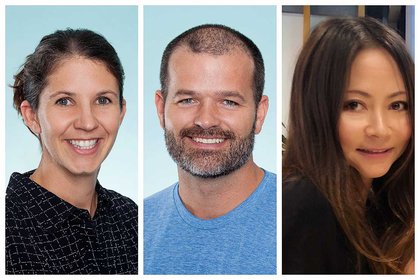
(from left) Dr Nikki Freed and Dr Olin Silander are investigating cheaper, faster virus testing methods, and Dr Liangni Sally Liu is studying social impacts of the pandemic on New Zealanders.
Two teams of Massey researchers have received more than half a million dollars in Health Research Council grants for studies that will help in the fight against COVID-19.
Genetics senior lecturers Dr Olin Silander and Dr Nikki Freed, from the School of Natural and Computational Sciences at Massey’s Auckland campus, received $165,471 to further develop a rapid diagnosis and genome sequencing method to follow COVID-19 outbreak. They aim to create a faster, cheaper way to turn around test results and to do genome-sequencing to identify the origin of the virus among those who test positive for COVID-19.
Dr Liangni Sally Liu, a senior lecturer at the School of Humanities, has been awarded $350,325 for a two-year study to investigate social responses to COVID-19 in New Zealand. Her team will focus on how individuals and institutions have perceived and responded to the pandemic threat, and to issues of stigma and discrimination of specific ethnic groups.
The Health Research Council of New Zealand (HRC) and Ministry of Health have awarded more than $3.8 million to COVID-19 research in the fields of health and social science at universities and research institutions, as a result of an urgent funding call issued by the research agencies last month. HRC’s chief executive, Professor Sunny Collings, says the studies – funded through its 2020 COVID-19 New Zealand Rapid Response Research package announced last Friday – will contribute to global research efforts to manage COVID-19 while meeting evidence gaps specific to New Zealand, with careful consideration to health equity for Māori and Pacific groups.
Faster, cheaper testing to detect and trace COVID-19
Dr Silander and Dr Freed say the streamlined protocols for virus detection and genome sequencing they are developing could reduce the time it takes to test for the virus and to perform the viral genome sequencing, ultimately helping to curtail the spread of the virus.
They have partnered with an Auckland-based biotech company, Ubiquitome, to research the use of portable devices for rapid detection of the virus that causes COVID-19. The portable Liberty16 qPCR platform, developed by Ubiquitome, is a handheld, battery-powered, real-time polymerase chain reaction (real-time PCR) device that can quickly test for an active infection in a patient and relay sample data via an iPhone app.
“A current bottleneck in testing is the process of isolating the genetic material from the virus,” says Dr Freed. “This step takes time and chemicals that are currently in short supply. We will test alternative, quicker methods to alleviate this bottleneck. We also aim to use this portable device to screening larger numbers of people in a shorter time frame. For example, we aim to evaluate methods for ‘pooling’ samples; in other words, testing swabs from many people at once, rather than one by one. In one scenario, you could test all of the passengers on a plane within a shorter period of time for less money to see if anyone is sick.”
They will also test cheaper, faster methods of viral genome sequencing using a portable disposable sequencing device from Oxford Nanopore called the “flongle”. Dr Silander says it is “a relatively cheap device ($150) on which we hope to sequence up to 12 viral genomes at a time. Sequencing and sharing the genomes rapidly can help us to understand the source of new outbreaks and give us general information about transmission chains.”
This work will be done with the strain-tracking website Nextstrain.org and the help of Dr James Hadfield of the Fred Hutchinson Cancer Research Center, in Seattle in the United States.
Dr Susan Turner, chief scientific officer for Ubiquitome, says the company’s relationship with Massey scientists has been “invaluable” in progressing the research on use of Liberty 16 for COVID-19 testing.
Social impact of pandemic in New Zealand
Dr Liu is working with team of five researchers to better understand how diverse communities in New Zealand have responded to the pandemic. Concern that some communities have been stigmatised during the pandemic underpins the research.
Another focus of the research is to evaluate quarantine and self-isolation practices in New Zealand. “This part of research aims to help to improve these practices to contain the pandemic,” she says.
The team will conduct online questionnaire surveys and in-depth interviews of the general public as well as Asian and Chinese communities. Survey questions will ask about protective practices, perceptions towards public health messages, information sources, media consumption patterns, and opinions about the general public’s attitude towards the disease and at-risk populations. Researchers will also interview people who were quarantined and self-isolated, and run focus groups with key staff from the government organisations responsible.
“By understanding how the risk perception, communication, and reactions related to COVID-19 are produced in different communities and the media, and the impact on the stigmatised communities and individuals, we hope we can combat stigmatisation and racial discrimination which has surfaced during this global pandemic spread, mitigate the potential for adverse social outcomes, and respond to needs of groups adversely affected by stigmatization,” she says.
Her team includes PhD student Guanyu Jason Ran; Dr Yuan Gong, School of English and Media Studies; Distinguished Professor Nigel French, Food Safety and Veterinary Public Health; and Professor David Johnston, Joint Centre for Disaster Research in the School of Psychology, all from Massey, as well as psychology and rehabilitation expert Professor Richard Siegert, from AUT.